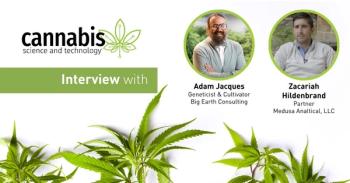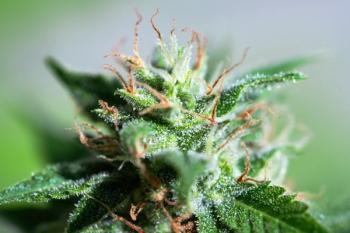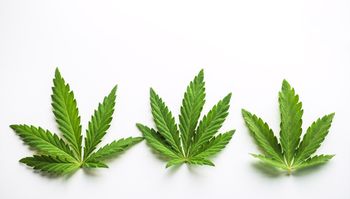
Dietary Modulation and the Endocannabinoid System: A Cannabis Science Conference West Preview with Dr. Lakisha Jenkins-Samuels

Cannabis Science Conference West, taking place May 18-20 in Long Beach, California, is quickly approaching. The two-day agenda is packed with exciting speakers from around the country as well as many prominent women moving the industry forward. In honor of Women’s History Month, we connected with Dr. Lakisha Jenkins-Samuels, a traditional naturopath, Dr. Lakisha™️.
Here, Dr. Lakisha shares a small preview of her talk, “Dietary Modulation of the eCS,” what it means to be a naturopath, how she got involved in the cannabis space, and more. Dr. Lakisha is a traditional naturopath and registered clinical herbalist. Her core competencies include utilizing herbs as the basis of nutrition to combat the symptoms of chronic, degenerative, and terminal illness. While her focus includes the biochemical and physiological effect of phytocannabinoids, she is an advocate for all plant medicine. Join us in this special sneak peek into her talk scheduled for Thursday, May 19 from 9:30-10:30 a.m.
Your keynote presentation is titled “Dietary Modulation of the Endocannabinoid System.” What inspired you to present on this topic and what are you most excited to share on this topic with our audience?
Dr. Lakisha Jenkins-Samuels: I think really what inspired me is that as the cannabis industry is developing globally, not just domestically in the United States, but globally, and especially with adult use legalization coming online, I think that, sometimes, if you're not in the world of the medical, therapeutic, or analytical science sort of genre of the industry, you sort of miss the mark. You're looking directly at adult use, or adult consumption type of methods of administration and those things. And we don't really understand the relationship with our body and our endogenous cannabinoid system and how important nutritional supplementation is for the maintenance of human life.
I think that when the medical cannabis industry first started, a lot of people used the argument of the therapeutic and medical uses because they really needed to be able to articulate why they were using this particular herb. And now with legalization, sometimes that gets a little lost in translation. So, for me, I want to bring the conversation back to the nutritional aspects, the nutritional values, and how important it is for us to pay attention to our endogenous cannabinoid system to induce homeostasis, or balance, and overall health and wellness.
Do you see any evolution as far as the education on this topic for doctors and nurses while they're getting their traditional education? Or is it still in the “dark ages,” if you will? Or are you seeing a little bit of movement there?
Dr. Lakisha: I'm definitely seeing some movement, and I think the movement is sort of fueled by consumers. It's fueled by the consumer demand for wanting more. The consumers are very savvy these days, I've noticed, and I think most of it is because of the regulatory landscape. When you're in a state or an area that only has medical, you must be articulate, again, in why you're using it. So, you have to approach your medical professionals and share with them your consumption habits and your reasoning behind it. I think when the patients are coming to medical providers with that level of articulation and education when it comes to the endogenous cannabinoid system, medical providers feel like they need to step their game up, for lack of a better term. They really want to be educated so that they can help do the best for their patients. So, I'm seeing movement there and it's definitely fueled by consumer demand.
Which types of people do you think would benefit the most from hearing your presentation at CSC West?
Dr. Lakisha: I think anyone in the general populace. I love to say this, and you'll hear me say it a lot: unless you're a small child or were exclusively nursed you're probably suffering from some sort of endogenous cannabinoid system deficiency, because endogenous cannabinoids are found in breast milk. With this talk about the nutritional aspects, there are several botanicals that have a phytocannabinoid profile, not just cannabis and hemp. There are a number of ways that you can help to supplement your endogenous cannabinoid system beyond just cannabis and hemp but enhanced by that. I want to give some real-world information and guidance, if you will, to help everyone learn ways that they can supplement their endogenous cannabinoid system nutritionally.
Many people in our audience tend to be educated on these topics fairly well, depending on the topic and the track. For the audience member who might know a little bit about the endocannabinoid system already, could you share one or two little snippets from your talk that they might not already know that they could potentially learn more about at the show?
Dr. Lakisha: Definitely. I think one of the major highlights would be speaking to the way your metabolism works with the endogenous cannabinoid system and ways that you can actually use different supplements to combat the symptoms of chronic and degenerative illnesses such as chronic inflammation, chronic pain, and things that we may not necessarily look at. We tend to look at those real degenerative or maybe even terminal illnesses as the only things that can benefit from the use of phytocannabinoid supplements. I think that with my talk, I really want to touch on ways that you can start supplementing today to use in a preventative sort of way, so that you're not going down the road of those chronic or degenerative illnesses. It's real-world practical advice that you can use yourself, you can share with your peers, share with your patients to be able to help people to learn a little bit more. Even if you're savvy, I've made it a point to touch on some new research that's out there that you can use as practical advice to touch at some points that you may not know.
Well, I look forward to that, and I'm sure our audience can't wait as well. Now I want to talk a little bit about you, Dr. Lakisha, because you're a world-renowned medical cannabis expert who has been all over the globe advocating and educating for this plant, and you yourself are a traditional naturopath. For anyone not familiar with what that is, would you mind just sharing a little bit about what traditional naturopaths do and maybe a more about what you do specifically with cannabis?
Dr. Lakisha: Sure, no problem. I have a PhD in naturopathy. Really, as a traditional naturopath, we believe in living as close to nature as possible, number one. We believe at the core of our ideology that there is only one illness and that's the absence of health, whatever that means for you. At its core, what we try to do is to get your body to homeostasis or balance—the optimal working condition.
So, we take a “less is more” approach, more of a nutritional approach and help you learn how to optimize the function of the human body. That, coupled with my registration, my professional standing with the American Herbalist Guild as a clinical herbalist. I have a working knowledge of a number of botanicals and how to compound them nutritionally to aid in inducing that level of homeostasis or balance in the system.
I focus on the endogenous cannabinoid system because it's our master regulator. It helps to actually induce homeostasis in the system. If you don't start with the master regulator that governs things like cognitive function and sleep patterns, digestive patterns, all those things, you're sort of missing the mark. So, for me, studying the endogenous cannabinoid system, speaking to the nutritional supplementation, is really the foundation, if you will, for providing overall health and wellness.
It sounds like there's such synergy between being a traditional naturopath and working in cannabis because, really, this is a natural product that does come from the ground. Can you share why it’s important to use natural products as much as possible or how dedicated you really need to be to achieve that?
Dr. Lakisha: You have to work really hard. Even for me, I try as best as I can. It is definitely a lifestyle. It's a dedication for everything to be natural. But I think that, as society has progressed, especially with technology, we've sort of been three, four, sometimes even 10 times removed from where our food comes from and how it's produced. I really want to empower people to just understand that sort of cycle, organisms and their life processes, and how they relate to each other and the environment. That's us as humans. That's botanicals and plants. That's animals. It's everything on how we all relate to each other. And I think once we re-educate ourselves in that manner, we will really find that it's not as complicated as it seems to be. The simplicity of it is the beauty of it at the end of the day.
One thing that the Cannabis Science Conference has always been a fan of advocating for is the future of precision and personalized medicine in cannabis: working with the individual and their genetic makeup as well as treating the condition. What are your thoughts on that? Do you think we're getting closer to that, or do we still have a ways to go?
Dr. Lakisha: I think we are. I think, in the medical system as a whole, personalized medicine is really starting to become a great highlight. The way our system works now, we take symptoms and based on symptom presentation, we come up with a disease diagnoses and then we come up with a treatment protocol that's usually pharmaceutical. It really doesn't leave a lot of room for individuality or personalized medicine. But, again, I think it’s being driven by consumer demand. It's definitely a focus that is being generated now on taking that individualized approach and, especially, when it comes to phytocannabinoid supplementation because there are so many genetic profiles, cultivars, and chemovars—so much information is out there.
Again, the way our metabolism plays a role is going to sort of govern your positive or, potentially, adverse outcomes from using a phytocannabinoid supplement. People are getting savvy and they're getting smart. And, again, they're very educated and they're demanding more. So, absolutely. I think as a whole, we're seeing a trend in the medical community that personalized medicine is the road that we're going to have to go down, just to make sure that people are experiencing that overall health and wellness.
Would you mind sharing with us what originally led you to get involved in the cannabis space?
Dr. Lakisha: Yes. So, my oldest daughter was diagnosed with two different types of brain tumor in 2002 when she was eight years old. And, again, we sort of went down that symptom then diagnoses protocol. Because her tumors were so rare, they really hadn't seen that type in the brain very often—only twice, to be honest. The doctors were following a protocol from a different tumor, and I didn't think that that was right. So, for me, that was my catalyst for change, that was my catalyst for advocating for everyone to be able to utilize whatever therapy you think is best for you. Because at the end of the day, nobody knows how you operate better than you. I can't tell you how you operate better than you.
What I can do, though, is like walk with you down a path, educate you with what I know, and help you to apply that to your life in the best way possible. At the end of the day, that was my catalyst for change, that was my drive, that gave me my drive and my passion for education and empowerment 100%.
What are one or two of the things that you're most excited to see or hear about at Cannabis Science Conference West?
Dr. Lakisha: For me, it's always the analytical and testing component. I study so much the nutritional, medical, and therapeutic side. And I love to hear the talks and hear the new information out there. But, again, because a lot of emphasis as we're moving into more regulated markets is put on adult use, sometimes, the analytics and testing is lost in translation.
It is so important, again, especially if we're going down the road of individualized personal medicine, that we understand all the active constituents—the cannabinoids, the terpenes, the flavonoids, the lipids—all those things that are contained in the cannabis plant and the synergistic way that they play with each other. Just knowing that there are instrument providers and there is information out there that helps you to analyze that information, collect data, and really be able to provide that personalized precision type of nutritional supplementation, for me, that is…I'm ready to nerd out to be honest!
I'll just put a little bug in your ear regarding your new track on psychedelics. At the show in Baltimore, which I was so proud to be able to participate in, I had a chance to visit with Dr. Denise Vidot, who is really doing some groundbreaking research in psychedelics. She's going to be here in Jamaica just before the Long Beach show. I'm really excited. But here in Jamaica, psilocybin is 100% legal and there are a lot of new businesses and products that are popping up. For that particular track, where I pride myself with knowing about botanicals, that's definitely a new area of nutrition and medicine where I myself need to do more research and dig right in. And I'm so happy for your show and so happy for the resources that I'm able to glean from it, so that I can be able to come back to Jamaica even, and provide that information for all the people who are developing products and services here to service that part of a new and emerging industry.
Did you have anything else that you'd like to share?
Dr. Lakisha: The only thing that I would like to share is my love for Josh because he's awesome, and I really appreciate, again, the platform and the advocacy and education that you spread. This is very important. It's a very important point, and it's very important for mothers like me who really want to help. At the end of the day, I'm happiest when I'm in the service of others and being able to utilize this platform to really highlight my passions. It's the highlight of my year. So, thank you so much, Josh.
Please join Dr. Lakisha at the Cannabis Science Conference West on May 19 from 9:30 to 10:30 a.m. in the Medical Track.
Newsletter
Unlock the latest breakthroughs in cannabis science—subscribe now to get expert insights, research, and industry updates delivered to your inbox.




